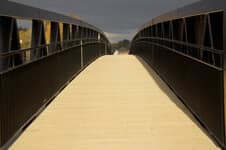
To meet the use class requirements of a project in a coastal estuary, all boards were treated to ‘Use Class’ 4. For total peace of mind the timber was pre-cut to size and pre-drilled before ‘Use Class’ 4 preservative treatment. This high specification ensures complete coverage without cut ends on site and doesn’t leave exposed untreated timber open to the elements.
Logistically, it was impossible to access the site with a large enough crane by road, so the specialist sub-contractor teamed up with Axminster excavators to find a solution, comprising of a bespoke hydraulic lifting platform and rafts, to float the bridge spans to site. All of this had to be done through the narrow estuary channel, working with the ebb tide to pass under bridges that would have been too low at high tide. EMS floated the bridge spans to site and the bridge was installed from the waterway in a 30 minute high tide window.
Once the bridge spans were in place, the timber decking was installed onto it. As the cutting and drilling had been completed during manufacture, the process was more efficient on site.
The planning and installation of this job by Exeter Maritime Services, demonstrated innovative thinking and precise execution. The team used local knowledge and worked with nature to complete the job.
To read more about non-slip decking for boardwalks, bridge and cycle paths click here.